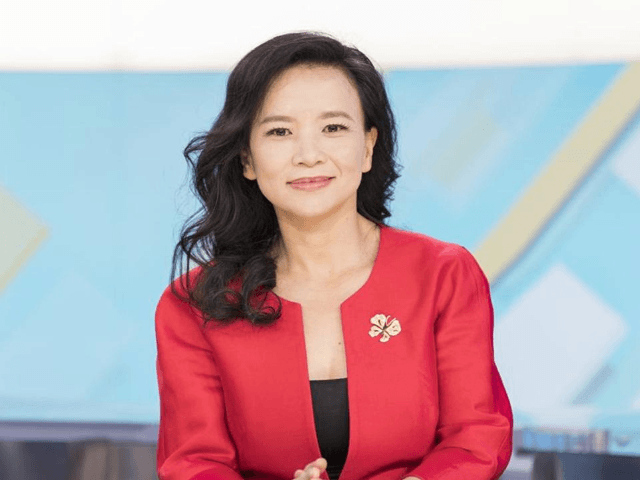The Australian Foreign Ministry revealed on Monday that Chinese-born Australian journalist Cheng Lei has been detained by the Chinese state without formal charges or legal representation.
The Australian government refused to speculate about why Cheng was detained, citing “privacy obligations,” but Australia’s diplomatic relations with China have deteriorated steadily since the Wuhan coronavirus outbreak.
Cheng is a naturalized Australian citizen who was born in China. Her resume includes working for Chinese state media, as summarized by the South China Morning Post (SCMP):
Cheng, who began her career in finance in Australia, had been working for state-run CGTN and its forerunner CCTV News since 2012, according to her LinkedIn page, and previously worked as a China correspondent for nine years for US business network CNBC.
She moved to China to work as a business analyst with a Sino-Australian joint venture in 2001, and was well-known within expat and business circles in Beijing. In recent years, she hosted the Australia China Business Awards and Apec Women Leadership Forum, and appeared as a panellist on the ABC current affairs show Q&A. In October, Cheng was the master of ceremonies for the Norway Asia Business Summit 2019.
In a video posted by the Australia Global Alumni YouTube channel in 2018, Cheng described her passion for covering China as a journalist.
“Beijing is the beating heart of China where politics, culture, commerce, technology all collide,” she said. “You have a lot of contrasts – and that is what makes it fascinating.”
Cheng also worked for American news network CNBC for nine years. According to the SCMP, CGTN ominously deleted her author page and wiped all episodes of her TV show from its website on Monday.
Cheng was in Beijing covering the opening of an American fast food restaurant called Shake Shack when she was last heard from on August 12. She posted some photos of her visit to the restaurant on social media with the message “make shakes, not war.”
At some point on, or soon after, August 12, the Chinese government kidnapped her. Australian officials said Beijing notified them of her detention on August 14 and Australia made its first official statement about her detention on Monday, August 30. Australian consular officials said they were allowed to speak to Cheng by video chat on August 27.
According to Australian media, Cheng is being held in “residential surveillance at a designated location,” under protocols that would allow the Chinese state to detain her for up to six months without charging her with anything or giving her access to legal representation.
Cheng has two children, who are reportedly staying with her family in Melbourne, Australia. The family issued a statement saying it was “in close consultation with DFAT [Australia’s Department of Foreign Affairs and Trade] and doing everything we can as a family to support Cheng Lei.”
“In China, due process will be observed and we look forward to a satisfactory and timely conclusion to the matter. We ask that you respect that process and understand there will be no further comment at this time,” the family statement added.
Judging by the responses posted on social media, Cheng’s friends and colleagues are much less sanguine about China’s “justice” system than her family.
“Absolutely horrifying. This is outrageous. What the heck do they claim she did? She works for state media. She obviously is not some kind of spy,” one of her colleagues wrote on Facebook, alluding to her career with Chinese Communist state media and the fact that very little of her reporting for any media outlet could be construed as harsh criticism of the Chinese government.
“She would tend to give more of the ‘Beijing’ perspective on issues, but remained a true journo, and would defend her positions both respectfully and forcefully,” said another.
The Australian government has warned its citizens about the dangers of traveling to China. Another Chinese-Australian named Yang Hengjun, a pro-democracy activist, was seized 18 months ago on murky “national security” charges and has been given very limited access to Australian consular services.
China also notoriously abducted two Canadians, Michael Kovrig and Michael Spavor, and has tried using them as leverage to make Canada release Huawei executive and Communist Party royalty Meng Wanzhou before she can be extradited to the United States to face fraud and sanctions-busting charges.
Charles Stuart University professor Clive Hamilton, himself the target of Chinese censorship efforts for his criticism of the Communist regime, wrote at the Brisbane Times on Tuesday that Cheng is “a strange choice for a diplomatic hostage.”
Hamilton speculated Cheng could have been kidnapped to send a message to the Australian government that it is time to back away from its push for an independent probe into the origins of the coronavirus, or to activate the Australian opposition, noting that “Beijing apologists” are already blaming Prime Minister Scott Morrison’s “reckless anti-China rhetoric” for putting Cheng in danger.
However, Hamilton thought the most likely target of the message brutally sent by Beijing is other foreign journalists. “For those asking what Cheng Lei is said to have ‘done’, we don’t know. That’s the point,” he quoted BBC correspondent Stephen McDonell saying.
Hamilton broached the delicate question of Cheng Lei’s allegiances, noting that Beijing tends to view Chinese-born dual citizens as its subjects in perpetuity, the Chinese Communist Party has a penchant for threatening family members to compel obedience from those living overseas, and Australians are well aware that Cheng has not been playing enthusiastically for their team. He suggested that might have been a factor in Beijing’s choice of Cheng as hostage, carefully calibrating their message by choosing a victim whose plight may not provoke a strong patriotic backlash from Australians.
Deutsche Welle noted on Tuesday that Cheng’s arrest has indeed “sent shockwaves through China’s foreign journalist community,” which apparently suspects she was targeted for offering some mild criticism of how China handled the coronavirus outbreak.

COMMENTS
Please let us know if you're having issues with commenting.